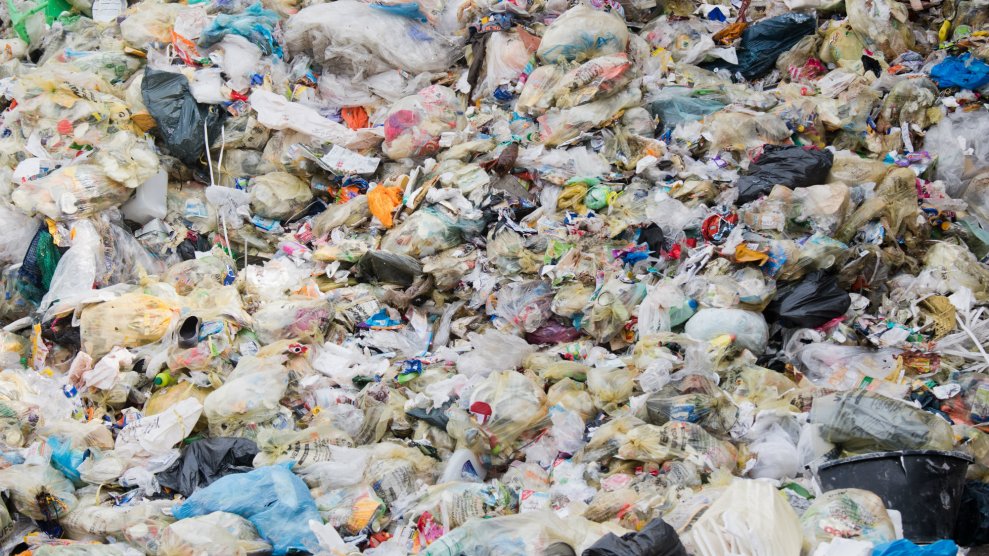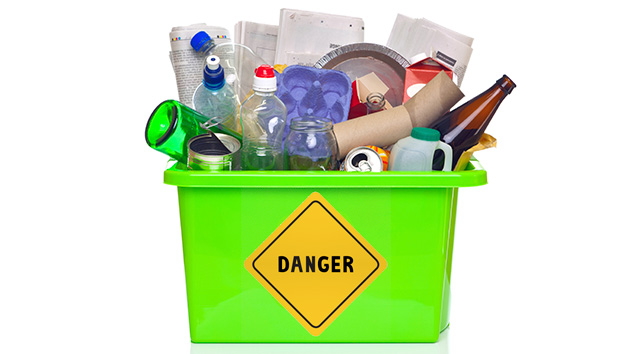
Julian Stratenschulte/DPA via ZUMA Press
This story was originally published by HuffPost. It appears here as part of the Climate Desk collaboration.
Americans recycle millions of tons of trash every year. We trust that the items we toss in the blue bin won’t end up in a landfill. We hope this stuff is repurposed and turned into reusable goods―but a lot of it isn’t getting recycled at all.
Two-thirds of US states are facing a recycling crisis of our own making. For months, mountains of plastic, paper and other materials have been piling up at recycling facilities across the nation. Recyclables are ending up in landfills en masse. Some municipalities—from Sacramento, California, to Hooksett, New Hampshire—have canceled or significantly curtailed their recycling programs, leaving residents with no choice but to throw their recyclables in the trash.
To put it in the words of a waste manager in Bakersfield, California, the situation is “not just a little bad, it is terrible.”
“I’ve been in garbage all my life. This is unprecedented,” Kevin Barnes, the city’s solid waste director, told The Bakersfield Californian earlier this month. “I think there’s been nothing in history this severe for the markets. So we’re in uncharted waters here.”
The first signs of trouble came in January when China, which had long served as the world’s de facto wastebasket, banned the importation of several categories of recyclable waste. For decades, China had bought massive shipments of recyclable plastics, paper, cardboard and other materials from countries around the world.
It had been a win-win situation. On the one hand, China needed a steady supply of recyclable waste to feed its flourishing manufacturing sector. And on the other, countries like the US, Canada, Germany, the UK and Japan lacked the recycling facilities and manpower that China had―and they desperately needed a destination for their growing quantity of garbage.
About a year ago, however, China abruptly announced its intention to close its borders to this trash influx. The country notified the World Trade Organization that it would be banning the import of 24 categories of solid waste, including several kinds of scrap plastic and mixed paper. It also demanded that other waste materials, like cardboard and scrap metal, have only 0.5 percent contamination from food and other sources―a standard that American recyclers have said is “impossible” to meet.
The immediate global impact of the new Chinese restrictions, enforced on Jan. 1, was staggering. “It was a huge shock—a tsunami for the industry,” said Arnaud Brunet, head of the Bureau of International Recycling, speaking from Brussels on Wednesday. “When the biggest market for recyclables progressively shuts the door to imports, you can expect the global industry will be under stress.”
Prior to its new policy, China had been processing at least half of the world’s exports of waste plastic, paper and metals. Between 1992 and 2016, China accepted more than 110 million tons of plastic scrap from countries around the globe, or about 45 percent of the world’s plastic waste. A recent study predicts that about 120 million tons of plastic waste will be displaced worldwide by 2030 because of China’s policy change.
The United States has long been one of the biggest exporters of trash to China. Of the estimated 66 million tons of material that Americans recycle each year, about one-third used to be exported—a majority of which had been bound for Chinese shores.
Since January, however, local and state governments, together with domestic recycling companies, have had to figure out new destinations for all this garbage.
At least 38 states have experienced “noticeable” impacts since the policy took effect, according to Waste Dive, a D.C.-based publisher of waste industry news that’s been documenting the ban’s effects with this online tracker.
At least 10 states—including California, Hawaii, Massachusetts, North Carolina and Oregon—have been “heavily” affected. A waste coordinator in Alaska, another of the hardest-hit states, described the shake-up as “Armageddon for recycling.”
“At this point, there is no state in the country that has not felt at least something because of the ban,” Waste Dive reporter Cole Rosengren told HuffPost.
Is your #recycling facility being impacted by China's waste import restrictions? Check out our resources page and infographics for more information on policy and next steps! https://t.co/SHZ6KubZjH pic.twitter.com/ND8b7UvHJ9
— SWANA (@SWANA) July 15, 2018
Recyclables Get Dumped
Nowadays, however, there are few willing buyers―and none of them come close to filling China’s shoes.
“Overall, the value of a ton of recycling has declined by about 40 percent over the past year,” David Biderman, executive director of the Solid Waste Association of North America, told HuffPost in an email.
In some of the worst-hit places—like parts of the Pacific Northwest, which has traditionally sent a greater proportion of its recycling to China, and New England, where waste processing costs had been hefty even before the ban— there’s now “no market” at all for certain materials like mixed paper (cereal boxes, junk mail, magazines and the like) and some types of plastic, Biderman said.
Across the country, thousands of bales of paper and plastic are being stockpiled and stored at recycling facilities in the hopes that new markets will eventually be found for them.
E.L. Harvey & Sons, a recycling company in Massachusetts, told the New York Times in May that half of its 80,000-square-foot facility was stacked high with about 6,000 tons of stockpiled material. In New Hanover County, North Carolina, “piles of recycled cardboard” have reportedly sat unused for months.
Mid America Recycling in Des Moines, Iowa, told The Wall Street Journal that it had stockpiled about 1,000 tons of mixed paper, which it had hoped to sell when prices improved.
All of it, however, was eventually dumped in a landfill.
“We had to purge,” Michael Barry, the company’s president, told the paper in May. “There’s no demand for it.”
Dumping recyclables in a landfill is a recycler’s nightmare. “We hate the landfill. We do everything we can to avoid it,” Brunet said. “It’s a waste of resources—for the industry, for the planet.”
But many US recyclers have had to resort to landfills in recent months.
States like Oregon and Massachusetts have laws prohibiting companies from dumping recyclables―but have recently been granting waivers so firms can dispose of the materials they can’t seem to sell.
Garten Services, an Oregon recycler, told the New York Times that the company recently sought a waiver to dump about 900 tons of recyclables in a landfill.
Republic Services, one of the country’s largest waste managers, said it’s disposed of more than 2,000 tons of paper in landfills since January.
Some municipalities have raised recycling rates or even resorted to canceling or cutting back on recycling services. The Alaskan cities of Sitka, Ketchikan and Petersburg, for instance, have stopped accepting mixed plastics and paper to their recycling programs. In Arizona, one of the states believed to be less severely affected by the new recycling landscape, the city of Flagstaff nevertheless announced in June that it was limiting its curbside recycling collection to only #1 and #2 plastics.
Sacramento said it was similarly dropping several kinds of plastics from its curbside program, and Hooksett, a New Hampshire town of some 14,000 people, said it was canceling curbside collection entirely. The town has said the move is only temporary. The Hooksett Department of Public Works did not respond to questions about when the program would be reinstated.
‘A Real Wake-up Call’
China has been widely vilified as the cause of the current recycling fiasco. But industry watchers say the blame should not be placed on China, which has cited environmental and public health concerns, as well as a desire for self-sufficiency, as reasons for its policy change.
“China’s not the bad guy,” Mark Murray, executive director of the advocacy group Californians Against Waste, told the Los Angeles Times in June. “To the Chinese credit, they’ve decided they don’t want to have Third World [trash] sorting in their country.”
So, who then should be held accountable for this mess? It turns out we’re all to blame.
“People were upset and had been pointing the finger at China, but really, here in the US, it’s a shared responsibility,” Rosengren said.
China’s waste import restrictions have revealed just how flawed―and dirty― the American recycling industry is, and how bad American consumers are at recycling.
“One of the principal reasons China imposed these restrictions is that the scrap and recyclables that the US was sending to China included too much ‘contamination’―material that is not recyclables,” Biderman said. “This is because many Americans are ‘wishful recyclers’ and put items in the recycling container hoping that the recycling company or local sanitation department will recycle them.”
Dirty takeout containers, most plastic bags, batteries, Christmas lights, garden hoses and those takeout coffee cups from Starbucks are all not recyclable― yet many Americans toss their trash willy-nilly into the recycling bin without a second thought.
Rosengren also blames waste management companies for allowing higher levels of contamination over time. Before the ban, some companies were shipping recyclables to China with contamination levels of up to 30 percent, he told HuffPost.
“Things had been good, they were making money, so a lot of these companies got complacent,” he said.
Federal, state and local governments also failed to support and invest in domestic recycling infrastructure, Rosengren noted. “Everyone got complacent, they figured China would just be there… It’s been a real wake-up call for people.”
New Markets, New Opportunities
Industry experts say China isn’t likely to soften its stance on foreign scrap―in fact, the country recently suggested that it would seek to ban all solid waste imports by 2020. Global recyclers will thus need to evolve and adapt.
There are expectations that the downturn in the recycling industry will continue for many months, if not years. But there is also optimism that the recycling industry as a whole will eventually emerge better and brighter than ever.
“On the short term, it’s painful for the industry, but long term it’s probably a good thing for society at large,” said Brunet, who predicts more market diversity and better, cleaner recycling processes as a result of China’s policy change.
Already, new recycling markets have emerged to fill the void that China once occupied. In recent months, recyclables have flooded into other nations, mostly in Asia, including India, Thailand, Vietnam and Taiwan.
These countries have only a fraction of China’s processing capacity, however, and signs of strain are already starting to show.
“Vietnamese ports are clogging up due to the upsurge of plastic waste imports into the country,” Von Hernandez, global coordinator for the nonprofit Break Free From Plastic, said in an email. “In Thailand, the spike in imports is, unfortunately, fuelling demands to establish more incinerators in the country, which would be tantamount to exporting and externalizing one country’s toxic air emissions to another, if those plastic materials end up being burned in those facilities.”
It remains to be seen whether these other nations will be able to adequately― and sustainably―handle the new influx of waste.
Stateside, many opportunities have emerged for the American recycling industry―from investments in contamination reduction to the building of more recycling infrastructure.
“I hope that the federal government recognizes the value of strong municipal recycling programs in the United States,” Biderman said. “Recycling is a job creator―recycling creates up to seven times more jobs per ton than landfilling, preserves landfill space for what truly needs to be disposed of, and is good for the environment.”
Consumers, too, have a critical role to play in turning the recycling tide.
“People seem to think that once recyclables hit the curb, they just go away. They don’t think about the process,” Rosengren said.
Check your local guidelines to find out what can and cannot be recycled in your municipality―the rules tend to vary from city to city and county to county. “Make sure you’re giving the right stuff, and make sure they’re all clean and dry,” Rosengren said. “Get the peanut butter out of the jar, rinse your beer bottle out and remember to never, ever put plastic bags in your recycling. That’s death to a recycling facility.”
“Try to reduce your consumption,” he added. “Just because you’re recycling doesn’t mean you’re absolved of your environmental footprint on the Earth.”















